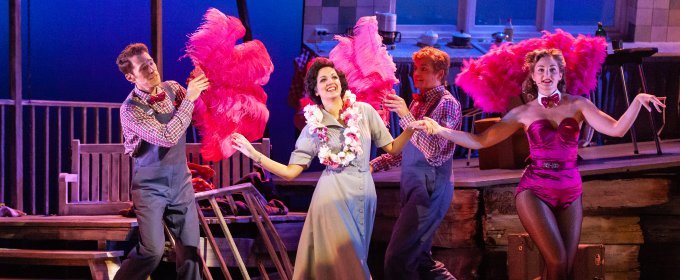Review: A QUIET PLACE at Grand Théâtre

Last Tuesday, the acclaimed opera A Quiet Place, written by American composer Leonard Bernstein, was presented at the Grand Théâtre of Luxembourg, featuring an impressive cast and many talented musicians. This version, directed by Orpha Phelan, did not diverge too much from the usual interpretations of the play, but it still managed to include some interesting new elements.
The story starts at Dinah's funeral, where all her friends and family gather to pay their respects to this loving mother and esteemed wife. The plot revolves around the present day interactions between Dinah's widowed husband, Sam, and his two children, Dede and Junior. Throughout the narrative, however, we are often taken back to episodes of the past, where we see the relationship struggles of a younger Sam and Dinah. The way this chronological back-and-forth is presented is perhaps one of the strongest elements of the show, with flashbacks scenes featuring different lightning patterns, different outfits and a tireless Jazz Trio advertising the charms of an idealized 1950s suburban America.
Sam, the central figure of this opera, is played by Huub Claessens (present) and Sebastià Peris (past). Both actors stand out in this performance, much due to their singing skills, but especially for the emotional depth given to such a complex character. We would risk saying that older Sam's outburst in act one, after seeing his son and daughter for the first time in many years, was the most intense and best acted moment of the entire play, mixing such a wide variety of emotions that it took the audience some time to process the magnitude of this scene. The dynamic between young Sam and Dinah (Turiya Haudenhuyse) was also noteworthy, displaying how easy it is to grow apart from someone we love so dearly. The influence of pride and fear should never be understated in romantic relationships, and this young couple's domestic life showed us exactly that.
.png)
But in the present the narrative also focuses on Dede (Lisa Mostin), Junior (Michael Wilmering) and François (Enrico Casari), Dede's husband who, at some point, used to date her brother. Although there is still some sexual tension between the young men, the bond between the two siblings does not seem to be affected. Far more intense, however, is the relation between Sam and Junior, who is incapable of getting his father's approval or experience the parental love he so desperately needs. His episodes of mental illness are often displayed, adding to the emotional weight of the play. Some could make the case that a few of these manifestations were a bit overacted, but we must not forget that this show is an opera. Yes, the setting is contemporary America and, yes, we are observing the lives and struggles of common people, but it is not uncommon for operas to have performance styles that might not seem too familiar to those used to modern day musicals and plays.
One of the main achievements of the night was to treat all these delicate subjects with a graceful lightness. The musical trio, for instance, was absolutely wonderful at all times, serving as comic relief for most of the scenes, while still helping to build the idealized suburban atmosphere.
We hope to see more of this great ensemble in the near future.
Image credit: Joost Milde
Reader Reviews
Videos

